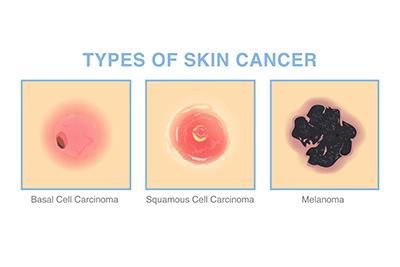Understanding Different Types of Skin Cancer

- posted: Aug. 30, 2024
Your skin, the largest organ of your body, is vulnerable to various conditions due to its constant exposure to the outer environment. One of the most concerning skin diseases that dermatologists treat often is skin cancer. Though undiagnosed skin cancers can pose a significant health risk, they are highly treatable in the earliest stages. Get a head start on skin care and treatment for skin cancer when you visit Dr. Sonya Campbell Johnson at Dermatology Associates in Tipton, Batesville, and Indianapolis, IN.
What Causes Skin Cancer
The skin is made up of regenerating cells, just like any other organ in your body. When negatively affected by external influences like the environment, the cells can replicate abnormally over time. Skin cancer is commonly caused by overexposure to damaging UV rays from the sun. It is also related to genetics, as many patients with a family history of this condition are more likely to develop it in their lifetimes.
Understanding the Different Types of Skin Cancer
Skin cancer comes in different forms with varying symptoms and degrees of severity. These are the main three types of skin cancer to monitor and discuss with your Tipton, Batesville & Indianapolis, IN, dermatologist if you believe you may be at risk:
- Basal cell (forms in the outer layer of skin and is the most common).
- Squamous cell (affects the outer squamous layers).
- Melanoma (forms in melanocyte cells at deeper layers of the skin and is the most aggressive type).
Skin Cancer Treatment Options
Mohs surgery is the preferred and most effective way to treat many cases of skin cancer. Throughout the procedure, the doctor uses a microscope to carefully remove abnormal cells, minimizing damage to healthy cells. Other options include cryosurgery (freezing cells with liquid nitrogen) and curettage and desiccation (burning away the cells with an electric current). Some skin cancer cases may require additional treatments, including medicated creams and radiation.
Schedule a Skin Checkup
The first step to resolving a potential issue with skin cancer is to have your skin examined by a dermatologist for a definitive diagnosis. Contact Dr. Sonya Campbell Johnson at Dermatology Associates in Tipton, Batesville & Indianapolis, IN, for a skin checkup today by calling (317) 257-1484.

- posted: Aug. 30, 2024
Your skin, the largest organ of your body, is vulnerable to various conditions due to its constant exposure to the outer environment. One of the most concerning skin diseases that dermatologists treat often is skin cancer. Though undiagnosed skin cancers can pose a significant health risk, they are highly treatable in the earliest stages. Get a head start on skin care and treatment for skin cancer when you visit Dr. Sonya Campbell Johnson at Dermatology Associates in Tipton, Batesville, and Indianapolis, IN.
What Causes Skin Cancer
The skin is made up of regenerating cells, just like any other organ in your body. When negatively affected by external influences like the environment, the cells can replicate abnormally over time. Skin cancer is commonly caused by overexposure to damaging UV rays from the sun. It is also related to genetics, as many patients with a family history of this condition are more likely to develop it in their lifetimes.
Understanding the Different Types of Skin Cancer
Skin cancer comes in different forms with varying symptoms and degrees of severity. These are the main three types of skin cancer to monitor and discuss with your Tipton, Batesville & Indianapolis, IN, dermatologist if you believe you may be at risk:
- Basal cell (forms in the outer layer of skin and is the most common).
- Squamous cell (affects the outer squamous layers).
- Melanoma (forms in melanocyte cells at deeper layers of the skin and is the most aggressive type).
Skin Cancer Treatment Options
Mohs surgery is the preferred and most effective way to treat many cases of skin cancer. Throughout the procedure, the doctor uses a microscope to carefully remove abnormal cells, minimizing damage to healthy cells. Other options include cryosurgery (freezing cells with liquid nitrogen) and curettage and desiccation (burning away the cells with an electric current). Some skin cancer cases may require additional treatments, including medicated creams and radiation.
Schedule a Skin Checkup
The first step to resolving a potential issue with skin cancer is to have your skin examined by a dermatologist for a definitive diagnosis. Contact Dr. Sonya Campbell Johnson at Dermatology Associates in Tipton, Batesville & Indianapolis, IN, for a skin checkup today by calling (317) 257-1484.
Our Locations
TIPTON OFFICE
Medical Arts Building
Tipton, IN 46072, USA
Hours of Operation
Monday
7:00 am - 4:00 pm
Tuesday
8:00 am - 4:00 pm
Wednesday
7:00 am - 4:00 pm
Thursday
7:00 am - 4:00 pm
Friday
7:00 am - 12:00 pm
Saturday
Closed
Sunday
Closed